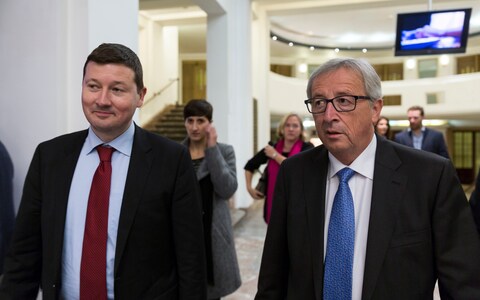Blood
Russian ‘blood money’ comment lands former top official in European Commission trouble
The European Commission has summoned one of its former top officials for a dressing down after he called continuing Austrian payments for Russian gas “blood money”.
Martin Selmayr is now the EU’s head diplomat in Vienna but was a feared figure in Brussels during the years of the Brexit negotiations and Jean-Claude Juncker’s presidency of the commission.
Known as the “Monster” of the commission’s Berlaymont headquarters, Mr Selmayr rose to be the executive’s secretary-general before leaving for Austria in 2018.
On Wednesday, he criticised Austria’s continued reliance on imports of Russian gas since Putin’s invasion of Ukraine.
“Blood money is being sent to Russia every day with the gas bill,” he said at an event.
He added that, as a rich country, Austria could afford to obtain energy from elsewhere like other states.
Austria’s foreign ministry summoned Mr Selmayr to explain himself on Thursday. The opposition hard-Right Freedom Party, which is leading polls before elections next year, called for Mr Selmayr to be sacked.
Mr Selmayr was a feared figure in Brussels during the years of the Brexit negotiations and Jean-Claude Juncker’s presidency
Credit: Thierry Monasse/Corbis News
As the row escalated, the European Commission issued a statement criticising its former head.
“The commission distances itself from the regrettable and inappropriate statements made by the head of the representation office in Austria,” it said. “The commission has asked [him] to report to Brussels immediately on this incident.”
The public rebuke is a dramatic fall from grace for Mr Selmayr, who has repeatedly denied being the source for notorious German media reports that Theresa May “begged” Mr Juncker for help with Brexit at a dinner during her time as prime minister.
The hard-nosed official’s rapid and unexpected promotion to become the bloc’s top civil servant was branded “Selmayrgate” amid accusations that it broke EU rules, which the commission denied.
He left the post for Vienna in 2018 after fellow German national Ursula von der Leyen took over from Mr Juncker as president.
There is a convention that the two most powerful jobs in the executive cannot be held by people from the same EU member state.
Austria’s coalition government of conservatives and left-wing Greens says that it is shifting away from Russia as a gas supplier but that the country faces various obstacles, including the fact it is land-locked.
In June, 60 per cent of Austria’s natural gas imports came from Russia, down from about 80 per cent before the war.
Karoline Edtstadler, Austria’s minister for European Union affairs, said: “We can only overcome the challenges ahead of us by working closely together. Not only do thoughtless comments such as those reportedly made not contribute to that but they are unsound and counterproductive.”

